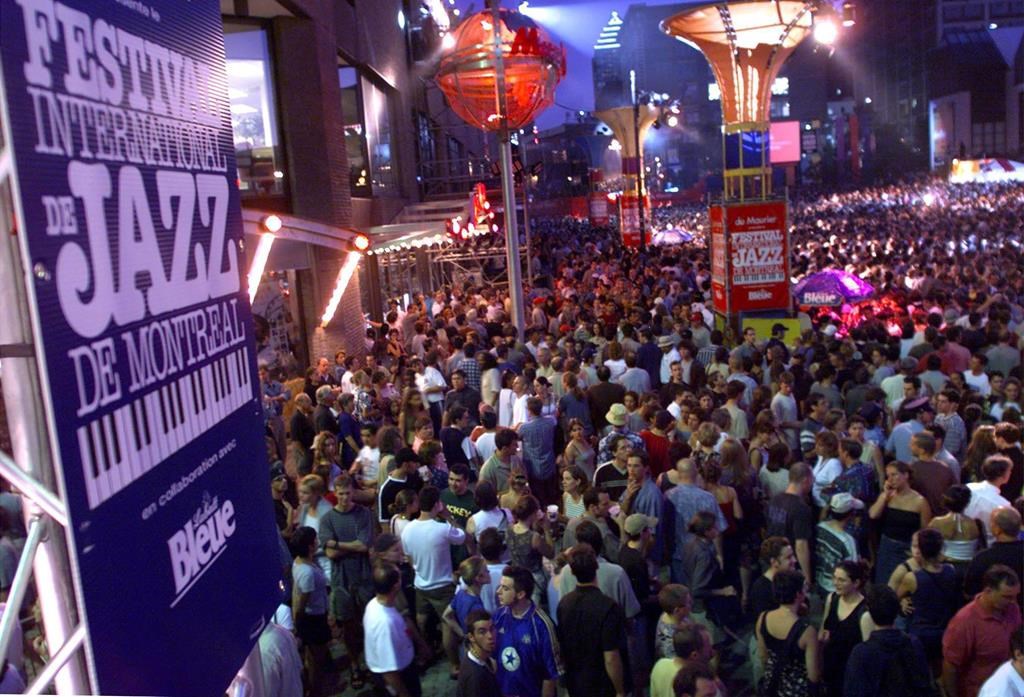Montreal has been having its quietest summer in recent memory, as COVID-19 put an end to a world-renowned festival circuit celebrating everything from jazz to circus arts.

While many events have moved online, the Quebec government’s decision this week to once again OK festivals _ with a new 250-person limit and social distancing rules — has others cautiously moving forward with scaled-down versions, which they say may have to be the reality for some time.
The St-Jean-sur-Richelieu International Hot Air Balloon festival, which normally attracts some 350,000 people per year to a site southeast of Montreal, has been grounded by COVID-19 along with the rest of Quebec’s major events.
Eric Boivin, the executive director of the festival, welcomes the government’s decision to allow festivals to reopen, even if it won’t change things for his event for 2020.
“From an industry perspective, it’s a good thing, but for a festival like ours that normally attracts tens of thousands of people per day, it doesn’t work,” he said.
READ MORE: Osheaga 2020 suspended due to coronavirus pandemic
Instead, organizers have gone in a different direction, bringing shows to seniors’ residences on a mobile stage. And, beginning this week, they turned a small part of the festival site into a venue for drive-in movies, music and comedy shows to run for the next few weeks, with the famous hot air balloons tethered in the background when weather allows.
But while Boivin’s large-scale festival can’t operate under the current rules, he believes smaller events can make it work.
Francois Chevrier, the director of a group combining festivals, tourist attractions and other events, said that many regional festivals are planning to go ahead following the government’s announcement. Those include a music festival in the Gaspe region beginning this week, as well as many smaller events based on food, poetry or fall colours.

Get breaking National news
While Quebec is known for giant events such as Montreal’s Jazz Festival or the Osheaga music festival, Chevrier said there are thousands of events in the province, and many have already been operating with smaller crowds and multiple sites.
“When Quebecers think of festivals they think about big festivals, big gatherings, but the reality in Quebec is more complex and diverse than that,” he said.
“There’s a food sector, there’s a sports sector, it’s very rich.”
Some events are opting for a hybrid model, which combines small in-person gatherings with larger live-streamed events.
READ MORE: ‘It’s not business as usual’: Montreal jazz fest takes performances online due to coronavirus
Montreal’s MUTEK festival, which celebrates electronic music and digital arts, will run about 30 events with small audiences in addition to live-streamed concerts.
Founder Alain Mongeau said with limited sponsorship and ticket sales, revenue from festivals has plummeted, even if grants and funding pay most of the bills.
Nevertheless, he believes it’s important to host in-person events at the September festival, no matter how small, in order to “create that in-person connection” after months of semi-isolation.
POP Montreal, a music and culture festival taking place in September, is banking on interesting outdoor spaces, such as rooftops, big backyards and alleys to create atmosphere for the small number of in-person shows that are planned.
Dan Seligman, the festival’s creative director, admits it won’t be quite the same without the crowds.
“It’s still music, it’ll be fun, but it’s not going to be what it was,” he said. At the same time, he believes the live-streamed events create an opportunity.
“In a way, we’re able to connect and reach a larger audience, ironically,” he said.
All the festival organizers agree that smaller-scale events are likely to be the reality for the foreseeable future.
READ MORE: Montreal’s Just for Laughs festival moving online this fall due to COVID-19
Boivin is determined that his festival’s namesake hot air balloons will fly again as part of the 2021 edition, “but without the big crowds, because we don’t know if we’ll be able to have them,” he said.
He said they’re already brainstorming ideas for formats that could work in the future within the current 250-person limit.
Chevrier said there are still challenges to be worked out for festivals, including figuring out how to be profitable with small crowds and the added expenses related to keep everyone safe. But he believes they will adapt.
“I think we felt this summer there was something missing in our cultural and tourist identity when the festivals aren’t there, it’s part of our way of getting together and living, very Quebecois,” he said.









Comments